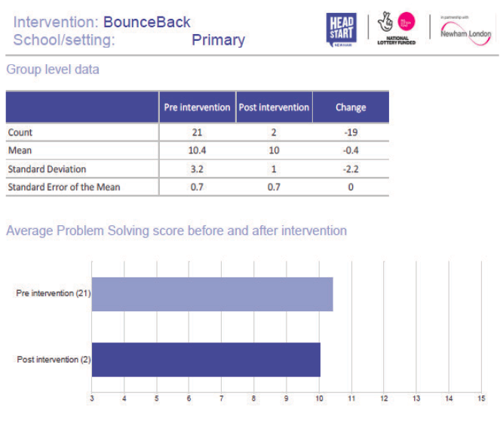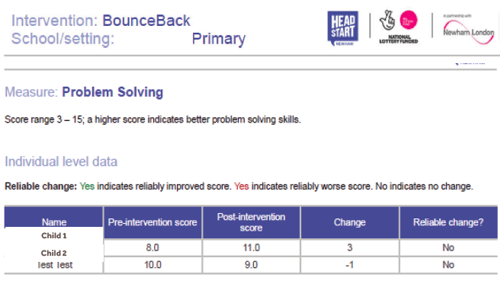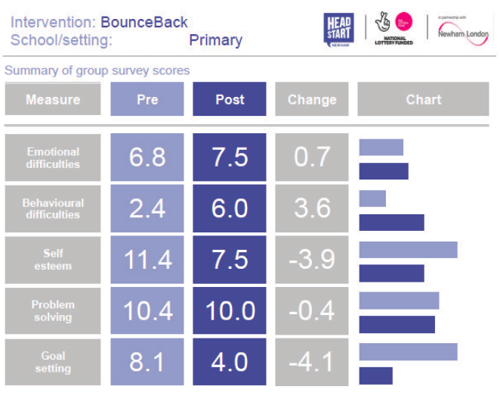HeadStart Newham provide school and community-based interventions for young people with emerging mental health needs. The service collects pre and post intervention surveys to measure young people’s self-rated mental health as well as key risk and protective factors for good mental health. HeadStart Newham worked to develop a user-friendly report for schools and community providers to see the progress of their young people following interventions. The reports were designed for a range of stakeholders including schools, delivery staff and the service leads, to assess whether the interventions meet the needs of young people and the objectives of the service.
The Child Outcomes Research Consortium (CORC), a member of the HeadStart Learning Team, supported HeadStart Newham with this work. CORC is the UK’s leading membership organisation that collects and uses evidence to enable more effective child-centred support, services and systems to improve children and young people’s mental health and wellbeing.
About HeadStartHeadStart is a five-year, £56 million National Lottery funded programme set up by the Big Lottery Fund, the largest funder of community activity in the UK. It aims to explore and test new ways to improve the mental health and wellbeing of young people aged 10 to 16 and prevent serious mental health issues from developing.
The Evidence Based Practice Unit at the Anna Freud National Centre for Children and Families and UCL is working with Big Lottery Fund and the HeadStart partnerships to collect and evaluate evidence about what does and doesn’t work locally to benefit young people now and in the future. Partners working with the Evidence Based Practice Unit on this evaluation include the Child Outcomes Research Consortium (CORC), Common Room, London School of Economics and the University of Manchester.
Introduction
HeadStart Newham wanted to create a standardised report to compare children and young people’s mental health and wellbeing before and after receiving the interventions they provide.
The report needed to be:
- Informative and user friendly
- Show any progress between the start and end of the intervention
Before designing the report, certain challenges needed to be addressed:
- Which data to present?
- What to do about missing data?
- How to assess reliable change?
This case study will look at what HeadStart Newham did, with CORC’s support, as well as their key learning points.
What did we learn about best practice?The reports were designed for a range of stakeholders including schools, delivery staff and the service leads, to assess whether the interventions meet the needs of young people and the objectives of the service. The HeadStart Newham Researcher, Valdeep, worked with a CORC Research Officer, Elisa, to develop the report. Elisa provided examples of similar data reports from other services for young people. This provided an excellent starting point for discussions. Explanations and support around how to use, and interpret local survey measures including the Me and My Feelings and Student Resilience Survey, ensured that the messages were clear and accurate.

Reporting impact on groups
Graphical representation was to be an important part of the report. It was important to choose graphics carefully and ensure they wouldn’t be misinterpreted. Elisa considered the measures being used and the best way to measure and report any changes for young people. It was important to explain any statistical terms using plain
English to ensure the report was accessible to the target audience. HeadStart Newham worked through several report iterations to get a format that worked. Getting feedback and suggestions from both a statistician and the target audience was essential as the report developed. Both parties gave very different feedback
and suggestions and the final report combines these two viewpoints - the service wanted analysis for groups of young people whereas the schools were interested in the
impact on individuals. The need to show statistical change for individuals was a particular challenge. Statistically this was quite complex but Valdeep and Elisa worked together to present the data in a way that was simple enough for the audience to understand.

Reporting on progress of individuals
HeadStart Newham now have a standard format to report back to delivery staff and partners, including schools about how the young people progressed on interventions.
Since sharing the reports, HeadStart Newham found the reports to:
- Provide evidence to schools about the work they do and the value of this work
- Motivate and engage youth practitioners with immediate feedback about young people’s progress on the interventions.
The reports are not an end point in themselves, they inform an effective conversation with schools about how to continue to support young people once the interventions
are completed. This maintains the quality and rigour of the support and ensures maximum benefit for young people.

Reporting on survey scores
Recommendations
- Do the research - start by looking at other reports to see what could work for your report
- Ensure data are presented in a way that’s honest and straightforward - choose graphics carefully
- Explain statistical terms in straightforward language that your audience can understand
- Get feedback from the audience it’s designed for throughout the development process and incorporate into the design
Many thanks to Valdeep Gill - Senior Researcher and Data Lead, HeadStart Newham.
Many thanks to Elisa Napoleone - Research Officer, Child Outcomes Research Consortium (CORC).